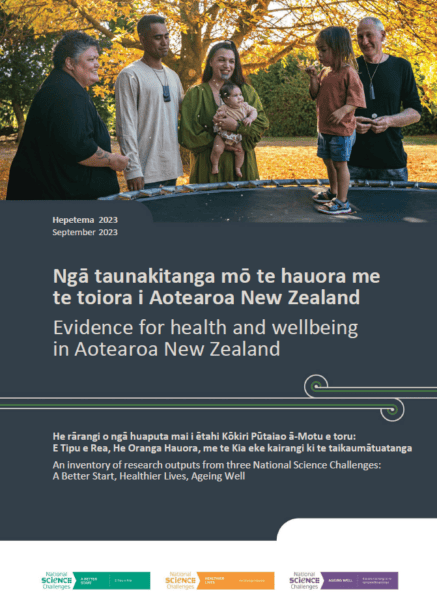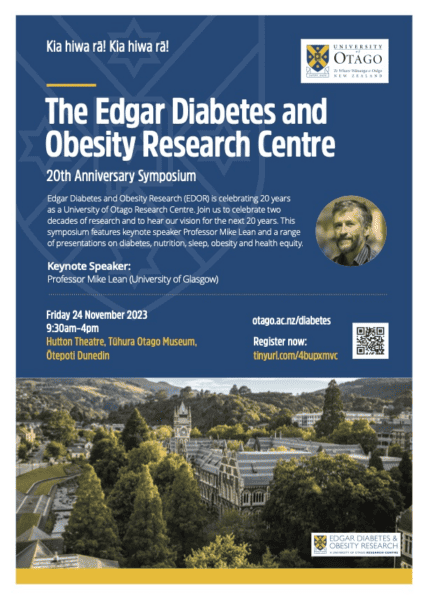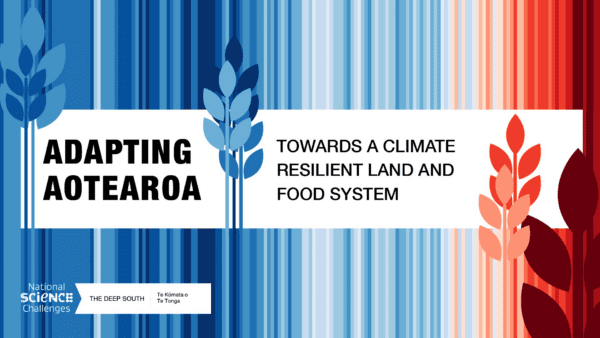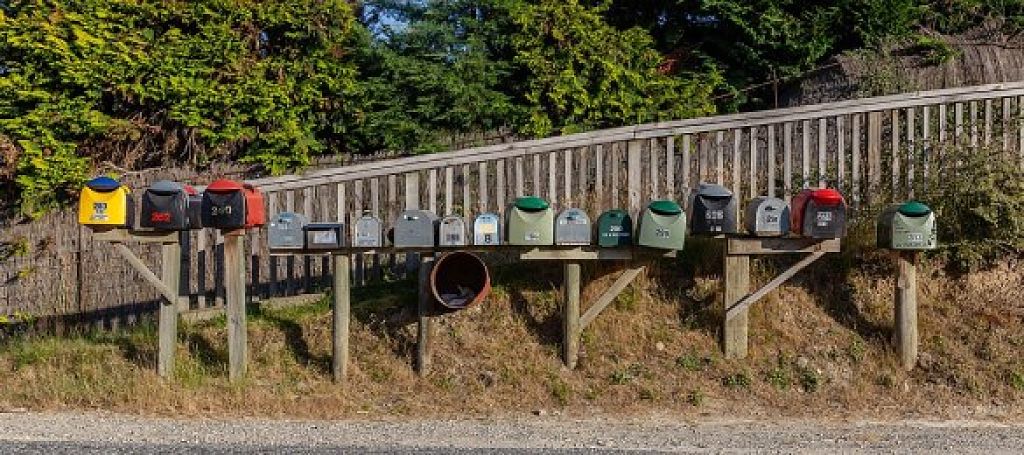Healthier Lives Newsletter September 2023
28 September 2023
Director’s update

It is rewarding to see the dissemination of Healthier Lives research evidence influencing the development of new health policies and programmes. This newsletter contains details about several promising initiatives.
The HYPE study has generated important findings and produced tools to assist with implementing a new national Healthy Food and Drink policy, and the Oire Tokoroa Family Diabetes Lifestyle Programme has trialled a unique Pasifika family-centred programme that is attracting interest from other communities.
Healthier Lives research evidence is also helping to inform the development of a National Diabetes Action Plan, sponsored by Te Whatu Ora and Te Aka Whai Ora. The Working and Steering Groups, co-chaired by Danielle Griffioen and me, have considered two programmes developed and evaluated with support from the Challenge (Mana Tu and He Pikinga Waiora Kimi Ora) as potential models for the treatment and prevention of type 2 diabetes. The cost benefit analyses in our 2021 Economic and Social Cost of Type 2 Diabetes report has also helped to provide direction for funding recommendations.
In 2022, Healthier Lives released the Pathways between research, policy and practice report, outlining the challenges of translating research evidence into health policy and practice in Aotearoa New Zealand. I am therefore delighted that the Ministry for Primary Industries has recently created a new pathway – the Food Policy Research Forum – for bringing food system researchers and policymakers together to support the development of evidence-informed policy. I was pleased to be invited to chair the inaugural forum which will take place later this year.
A crucial policy employed by comparable countries, but lacking in Aotearoa New Zealand, is a strategy to address the pressing food-related issues currently facing our country. Healthier Lives has long suggested that National Science Challenges (NSCs) could play an important role in developing a much needed National Food Strategy. Now seven NSCs have issued a strongly worded statement calling for a unified and science-informed approach to redesigning our food system.
Along with our efforts to inform health policy and programmes, we have taken steps to ensure the longevity of Healthier Lives research findings by commissioning the first Wikipedia page about a National Science Challenge. This will increase the visibility of our research internationally and allow easy access to our research findings well beyond the life of the Challenge. A newly published inventory of the research outputs of the three health and wellbeing NSCs will also help with the latter.
All these initiatives will help to ensure that Healthier Lives research has a lasting impact.
Jim Mann
National Science Challenges call for a National food Strategy

Seven National Science Challenges have issued a brief outlining why Aotearoa New Zealand needs a science-informed National Food strategy. Food is essential for human health and wellbeing and critically important to our export economy. These factors, combined with the effects of food production on climate change and our natural environment, mean that ensuring a sustainable, resilient, and affordable food supply for all New Zealanders must be a top priority for our country. Only an integrated food policy can address the complex ways in which food affects all of us.
Countries such as Australia, Canada and the UK have food strategies or plans to guide their approach to these interrelated areas. Given the breadth of research undertaken by the National Science Challenges, we are well-placed to share our combined research findings and expertise to help underpin a National Food Strategy. Other contributions will also be needed.
Please share this brief within your networks to generate a national conversation about this important topic.
Research updates
Two Healthier Lives-funded projects are nearing completion and have generated important results and resources that will inform new initiatives.
Oire Tokoroa celebration

The Oire Tokoroa Family Diabetes Lifestyle Programme, led by Massey University researcher Associate Professor Ridvan Tupai-Firestone, and co-designed with Tokoroa-based health provider South Waikato Pacific Islands Community Services Trust (SWPICS), led by Akarere Henry, recently held a celebration to mark the end of the project and provide feedback to the community.
This type 2 diabetes prevention programme, built around the central role of vaevae oro-oro (family champions) in supporting Pacific families, impacted positively on every aspect of daily life, including increased availability of food, better nutrition, improved literacy, more physical activity, new budgeting skills, closer family and community ties, and even on-going employment.
The family groups that participated in the programme co-created an intergenerationally-friendly Pacific cookbook which, along with Kai Tari food bags, enabled the whole family to participate in meal preparation. With family members working long hours or shift work, preparing meals and doing fun activities together as a family was hugely valued by participants. In addition, SWPICS staff have broadened their skillsets as community co-designers to further advance their services to the wider population in Tokoroa. There are plans to adapt this successful model for use in other Pacific communities, both in New Zealand and other Pacific Islands.
HYPE (HealthY Policy Evaluation) study

The National Healthy Food and Drink Policy, developed by the National Food & Drink Environments Network in partnership with the Ministry of Health, is one of the few New Zealand policies that aims to improve our food environment. It was adopted as a voluntary policy in 2016 by the previous District Health Boards and some central government agencies. In 2020, Healthier Lives commissioned Professor Cliona Ni Mhurchu and her team to evaluate the implementation and impact of this Policy.
The HYPE (HealthY Policy Evaluation) study found that the voluntary policy was not effective in ensuring provision of healthier food and drink options in New Zealand hospitals and health sector organisations, and recommended that a mandatory policy be implemented. With assistance from HYPE researcher and dietitian Magda Rosin, Te Whatu Ora is now working to develop and implement a mandatory food and drink policy using the results and tools developed in the HYPE study.

The working group charged with updating the Policy is now engaging with retailers and food service providers to gather their opinions on the current version of the Policy, find out what support they need to implement it, and identify sustainability initiatives that could be supported. The update of the Policy includes assessing the current food supply and evaluating products that are available as well as obtaining detailed nutrient and cost analyses of the typical foods/drinks supplied to the Te Whatu Ora facilities. The working group will also compare Policy criteria with similar policies adopted in Australia and engage with Māori stakeholders to ensure that the updated Policy honours and upholds Te Tiriti.
The research team recently published a scoping review of grey literature about the tools and resources used to support implementation of workplace healthy food and drink policies in several English-speaking countries. For details, see the Publications section below.
Healthier Lives Wikipedia page
Healthier Lives is collaborating with Dr Mike Dickison, New Zealand’s first Wikipedian at Large, to create a Wikipedia page for the Challenge. This is intended to enhance the accessibility and profile of Healthier Lives research, both nationally and internationally, and ensure ongoing access to it beyond the life of the Challenge. The Wikipedia page is a work in progress that will continue to be updated over the next year. We welcome any feedback.
Inventory of research outputs

The three health and wellbeing National Science Challenges have produced a wealth of research outputs, which have now been brought together in a single inventory: Ngā taunakitanga mō te hauora me te toiora i Aotearoa New Zealand | Evidence for health and wellbeing in Aotearoa New Zealand.
The inventory contains information about: new models of care and evidence of their effectiveness; frameworks and tools for ensuring that services deliver equitable outcomes; new clinical pathways and treatments; custom-designed apps, chatbots, games and websites; information resources to translate knowledge for service providers; and more.
It is organised according to the priority areas set out in Te Pae Tata Interim New Zealand Health Plan 2022:
- Better health in our communities
- Maternity and early years
- People living with cancer
- People living with chronic health conditions
- People living with mental distress, illness and addictions
with the addition of two other priorities:
- Ageing well
- Climate change.
We hope that this inventory will make the evidence and resources created over the past eight years by Healthier Lives and our sister science challenges, A Better Start and Ageing Well, widely known and available. Please feel free to share it and let us know if you have any suggestions for improving it.
Recent publications
Tools and resources used to support implementation of workplace healthy food and drink policies: A scoping review of grey literature. Rosin M, Mackay S , Ni Mhurchu C. Nutrition & dietetics: the journal of the Dietitians Association of Australia, 2023, 10.1111/1747-0080.12844
Dynamic ctDNA Mutational Complexity in Patients with Melanoma Receiving Immunotherapy. Fitzgerald S, Blenkiron C, Stephens R, Mathy JA, Somers-Edgar T, Rolfe G, Martin R, Jackson C, Eccles M, Robb T, Rodger E, Lawrence B, Guilford P, Lasham A, Print CG. Mol Diagn Ther. 2023 Jul;27(4):537-550. 10.1007/s40291-023-00651-4
Complex Patterns of Genomic Heterogeneity Identified in 42 Tumor Samples and ctDNA of a Pulmonary Atypical Carcinoid Patient. Robb TJ, Tsai P, Fitzgerald S, Shields P, Houseman PS, Patel R, Fan V, Curran B, Tse R, Ting J, Kramer N, Woodhouse BJ, Coats E, Le Quesne Stabej P, Reeve J, Parker K, Lawrence B, Blenkiron C, Print CG. Cancer Res Commun. 2023 Jan 10;3(1):31-42. 10.1158/2767-9764.CRC-22-0101
DNA methylation patterns at birth predict health outcomes in young adults born very low birthweight. Cameron VA, Jones GT, Horwood LJ, Pilbrow AP, Martin J, Frampton C, Ip WT, Troughton RW, Greer C, Yang J, Epton MJ, Harris SL, Darlow BA. Clin Epigenetics. 2023 Mar 23;15(1):47. 10.1186/s13148-023-01463-3
Tawhiti nui, tawhiti roa: tawhiti tūāuriuri, tawhiti tūāhekeheke: a Māori lifecourse framework and its application to longitudinal research. Edwards W, Hond R, Ratima M, Tamati A, Treharne GJ, Hond-Flavell E, Carrington SD, Poulton R. Journal of the Royal Society of New Zealand, 2023, 53:4, 429-445. 10.1080/03036758.2022.2113411
Manawataki Fatu Fatu for ACCESS (Māori and Pacific Hearts in Unison for Achieving Cardiovascular Care in Equity StudieS). Protocol for a Mixed Methods Programme of Research. Grey C, Brewer KM, Ameratunga S, Selak V, Hanchard S, Dicker B, Paynter J, Taueetia-Su’a T, Winter-Smith J, Newport R, Tane T, Harwood MLN. International Journal of Qualitative Methods, 2023, 22. 10.1177/16094069231176348
Reasons for Ethnic Disparities in the Prehospital Care Pathway Following an Out-of-Hospital Cardiac Event: Protocol of a Systematic Review. Newport R, Grey C, Dicker B, Ameratunga S, Harwood M. JMIR Res Protoc. 2023 Jul 12;12:e40557. 10.2196/40557
How pharmacist-led health services are tailored to minoritized populations, their acceptability and effectiveness: A scoping literature review. Hutchings JL, Grey C, Brewer KM, Aspden TJ. Res Social Adm Pharm. 2023 Sep;19(9):1256-1266. 10.1016/j.sapharm.014
Widening ethnic inequities in heart failure incidence in New Zealand. Chan DZ, Grey C, Doughty RN, Lund M, Lee MAW, Poppe K, Harwood M, Kerr A. Heart. 2023 Aug 3, 10.1136/heartjnl-2023-322795
Evidence-based European recommendations for the dietary management of diabetes. Diabetes and Nutrition Study Group (DNSG) of the European Association for the Study of Diabetes (EASD). Diabetologia. 2023 Jun;66(6):965-985. 10.1007/s00125-023-05894-8
Saturated fat and trans-fat intakes and their replacement with other macronutrients: a systematic review and meta-analysis of prospective observational studiesWorld Health Organization (2023); ISBN 978-92-4-006166-8
Congratulations

We warmly congratulate Professor Cris Print, Healthier Lives co-principal investigator, who was presented with a World Class Award at the Kea Awards ceremony on 7 September, one of seven recipients for 2023.
Scientist Cristin Print honoured in Kea Awards
In the news
Healthier Lives Chair to lead Te Ara Paerangi Strategic Panel

Healthier Lives Governance Group and Kāhui Māori chair Tā/Sir Jerry Mateparae has been selected to chair the Independent Strategic Panel tasked with recommending new National Research Priorities to Cabinet later this year.
The Panel also includes the chair of Our Land and Water National Science Challenge, Hōne McGregor.
The National Research Priorities are a central part of Te Ara Paerangi – Future Pathways, which builds on the National Science Challenge model to focus government research funding on the most important social, environmental, health and economic issues and opportunities for Aotearoa New Zealand.
Panel appointed to recommend National Research Priorities
Nicola Williams, PhD candidate funded by the ACTIVATION project presented at the Living Streets Aotearoa symposium (July 2023).
Fixing inequity in transport to make streets more accessible (subscription only access).
Upcoming events
Register now for EDOR’s 20th anniversary symposium
Friday 24 November
Hutton Theatre, Tūhura Otago Museum, Dunedin.

The Edgar Diabetes and Obesity Research Centre (EDOR) is based in the Department of Medicine at the University of Otago. Healthier Lives works closely with EDOR on our shared goals to address the obesity and type 2 diabetes pandemics.
EDOR is celebrating 20 years as a research centre by holding a symposium on Friday 24th November, with presentations on type 1 and type 2 diabetes, nutrition, food environment, sleep and obesity. The event will highlight EDOR’s future vision that prioritises equity and working with communities to create meaningful change.
Keynote speaker Professor Mike Lean (University of Glasgow) will talk about his groundbreaking work on the remission of type 2 diabetes using the DiRECT clinical protocol, a dietitian-supported weight loss programme using meal replacement diets. This approach is being rolled out to all eligible people with type 2 diabetes in England by March 2024.
Healthier Lives is funding a New Zealand trial of the DiRECT protocol to determine the cultural acceptability of the programme for Māori and Pacific whānau.
All are welcome to attend this free event and you can register on the EDOR website.

Adapting Aotearoa: Towards a Climate Resilient Land and Food System

Colleagues at Deep South Challenge in collaboration with Resilience to Nature’s Challenges and Our Land and Water are holding this event that you might be interested to attend.
Adapting Aotearoa: Towards a Climate Resilient Land and Food System conference will bring together researchers and stakeholders from the primary sector, academia and government to explore innovative solutions for building climate resilience and a deeper understanding of the urgency for adaptation in our agricultural practices.
Will you join us?
Adapting Aotearoa | 20 November 2023 | Christchurch Town Hall | $60
MC: Dr Andy Reisinger
Key Speaker: Professor Lauren Rickards, Director of the La Trobe University Climate
Change Adaptation Lab
Panelists: Veteran journalist Rod Oram; Anita Wreford (Deep South Science Challenge);
Nick Cradock-Henry (Resilience to Nature’s Challenges); Toha CE Nathalie Whitaker; Tim Henshaw (Head of Westpac Agribusiness); Jo Sheridan (Owl Farm) and Kate Acland (Chair of Beef & Lamb NZ).


